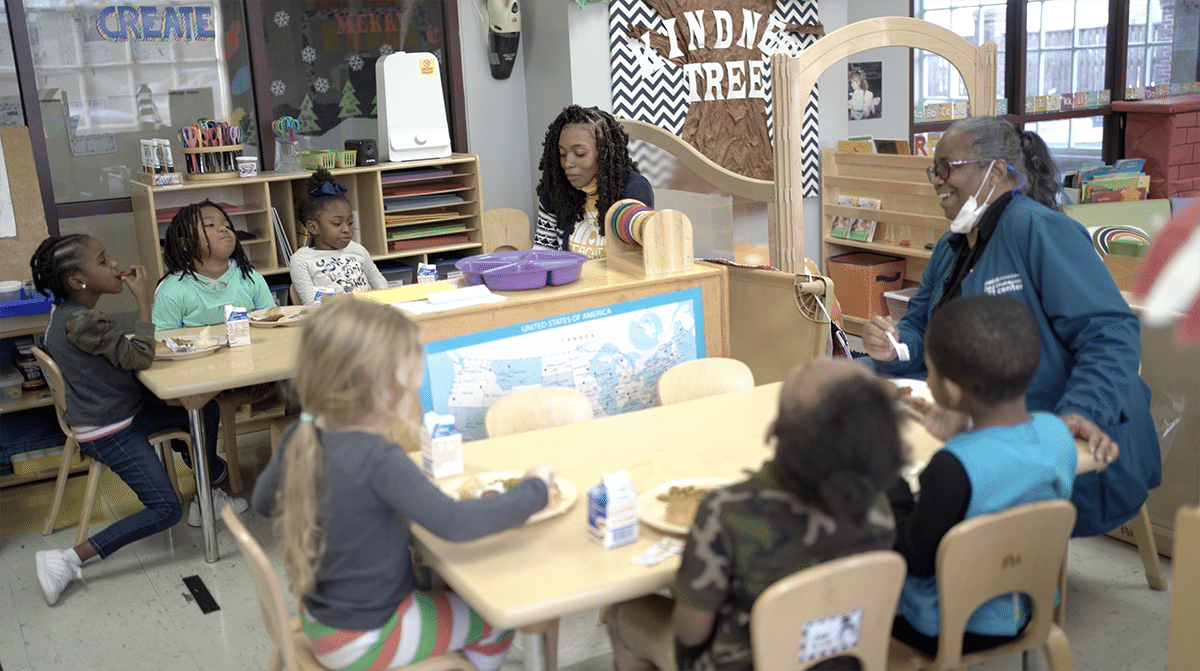Just as LENA Grow may help accelerate children’s language development, it may also help improve an early childhood teacher’s skills at fostering optimal language environments in their classrooms. That’s according to LENA’s recent data analysis of 445 teachers who have participated in LENA Grow.
One primary takeaway: While more experienced early childhood teachers foster more interactive talk in their classrooms, participating in LENA Grow helps less experienced teachers catch up. Regardless of the classroom environment — these numbers hold up across center-based, Head Start, and family child care settings — early childhood educators who are newer to the profession stand to gain the most from LENA Grow’s reflective feedback cycle.
“Some 5,000 early educators have participated in LENA Grow,” said Dr. Jill Gilkerson, Chief Research and Evaluation Officer at LENA. “We’ve now collected enough teacher experience data to see some very interesting patterns with respect to how different subsets of teachers respond to the program.”
Classroom interaction: Does teaching experience matter?
Among the foundational questions guiding the analysis was this: Do early childhood educators with more years of teaching experience engage in more conversational turns with the children in their care?
The short answer: Yes.
The longer answer: Yes, and there are a few different ways to think about these baseline numbers:
- Classrooms where the most experienced early childhood teacher had at least 15 years of experience came into the LENA Grow program engaging in approximately 21% more conversational turns on average than classrooms where the most experienced teacher had between one and four years of experience. (See Figure 1.)
- Classrooms where all teachers had at least 15 years of experience started the program engaging in approximately 35% more conversational turns on average than classrooms where all teachers had fewer than five years of experience. (See Figure 2.)
- Classrooms where the most experienced teacher had at least 15 years of experience were significantly less likely to be categorized as “lower talk.” A “lower talk” classroom is one whose children experience fewer than 15 conversational turns per hour on average.
When it comes to fostering teacher-child interaction in the classroom, then, experience matters. These numbers suggest that facilitating interactive talk is a skill that teachers hone over the long term, not necessarily an innate knack that they either have or don’t have.
One question naturally follows: How experienced is the early childhood education workforce?
While this data is difficult to collect, one report from the Center for the Study of Child Care Employment (CSCCE) offers some insights about educators in California specifically. While nearly two-thirds of center-based teachers have more than 10 years of experience, almost one in five has five or fewer years. In addition, over 40% of assistant teachers or teacher aides have five or fewer years of experience. Following the initial negative impacts of the COVID-19 pandemic, the child care workforce has recovered at a significantly slower rate than have other private sector industries. Only 76% of child care jobs have been recovered since early 2020, compared to 103% of all private sector jobs.
An even bigger question also follows: Is there a way to help teachers accelerate their skills?
That’s where LENA Grow comes in.
The LENA Grow effect: Who gains the most?
[quote]
As a data-driven professional development program, LENA Grow is designed to help early childhood teachers increase the amount of interaction their children experience. There are plenty of other associated benefits, including increased job satisfaction and feelings of self-efficacy among teachers and increased social and emotional skills and language development among children. At its heart, though, LENA Grow is about boosting one key metric: the number of conversational turns each child in the classroom experiences.
As established above, more teacher experience means more conversational turns at the very start of the LENA Grow program. How, then, do the numbers shift after teachers have participated in the program? Do less experienced teachers see the largest gains?
The short answer: Yes.
The longer answer: Yes, and there are a couple of different ways to think about these endline numbers:
- For children in classrooms where all teachers had fewer than five years of experience, including those with less than one year, conversational turn rates increased by approximately 22%. By comparison, conversational turn rates remained flat for children in classrooms where all teachers had at least 15 years of experience. (See Figure 3.)
- Classrooms that began the program classified as “lower talk” were more likely to surpass the 15 conversational turn threshold if the teacher had less experience.
- Children who started the program experiencing fewer than 15 turns per hour experienced an increase of 25% if their teacher was more experienced (15+ years), while they experienced an increase of 63% if their teacher was less experienced (1-14 years).
Looking specifically at Head Start classrooms, we see the LENA Grow effect even more clearly. Head Start teachers with fewer than five years of experience increased their conversational turn rates from approximately 27 to 32 conversational turns per hour, bringing them nearly in line with where more experienced teachers began (and ended) the program.
“What we see is that less experienced teachers were able to bring their conversational turn rates up to the level of their more experienced colleagues,” said Dr. Gilkerson. “Effectively, then, LENA Grow helped compress over a decade’s worth of experience into a matter of weeks.”
How might the Child Development Associate (CDA®) credential factor in?
The Council for Professional Recognition describes its CDA® credential as a way to ensure that early childhood educators “are well prepared to foster the social, emotional, physical and cognitive growth of young children.” As part of the present data analysis, LENA’s research team looked for links between having (or pursuing) a CDA® credential and teachers’ ability to foster more interactive talk in their classrooms.
The LENA research team found no correlation between baseline conversational turn rates and CDA® credentialing. However, the analysis did reveal that LENA Grow helped CDA®-credentialed teachers increase their interaction with children who entered the program experiencing the least amount of talk.
Lower-talk rooms, where the average conversational turn rate was below 15 turns per hour at baseline, showed significantly higher gains when their teachers had their CDA® credential. Lower-talk rooms with CDA® teachers showed a 47% increase in turns, while those without a CDA® teacher saw a 16% increase.
In the end, teachers who pursue their CDA® credential may be particularly well prepared to respond to LENA Grow’s reflective feedback cycle.
The bottom line: Classroom interaction and early childhood teacher experience
To be clear, we’ve heard plenty of highly experienced early childhood educators sing the praises of LENA Grow.
As just one example of many, for instance, Judy Berdan has been with the same Head Start program in Wisconsin for over 10 years, and she describes the LENA Grow effect with great enthusiasm: “I know how to talk. I know how to talk to kids. But it really helped me focus on learning how to listen to them. And when you started listening, then you were able to start building that relationship.”
The value of LENA Grow, then, reveals itself in more than just conversational turn rates. It’s often something that’s not necessarily measurable.
And yet there’s no denying what the present analysis suggests: Teachers who are relatively new to the profession, as well as more experienced teachers who have pursued CDA® credentials, may stand to benefit the most from participating in LENA Grow.
[callout]



